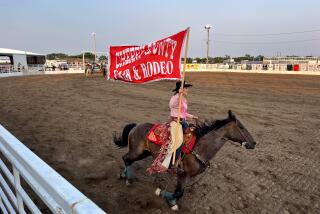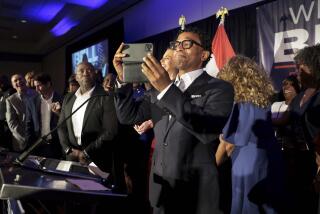Kerrey Drops Presidential Bid but Says the Spark âIs Still Aliveâ : Politics: The Nebraska senator, jolted by primary defeats, never got his campaign on track. He suggests another run for White House is possible.
WASHINGTON â Nebraska Sen. Bob Kerrey, out of money after a jolting series of defeats, called an end Thursday to a once-promising presidential campaign that never managed to kick into gear.
âI feel a little like the Jamaican bobsled team,â quipped Kerrey, who earlier had compared his third-place showing in New Hampshire to winning a bronze medal in the Olympics. âWe had a lot of spirit but, unfortunately, we didnât get a lot of medals.â
Kerrey added that he had âgained a great dealâ from an effort that often resembled a dress rehearsal rather than an actual presidential campaign. He suggested that he might be willing to try again, possibly as early as 1996, if the Democrats do not win the White House this year.
âThe cause that got me into this to begin with is still alive, and I feel a sense of purpose to participate in that cause. Iâve drawn a bead on the office of the President of the United States,â he said at a Capitol Hill news conference attended by several of his Senate colleagues and dozens of cheering supporters. âThe spark and the flame is still alive.â
Many Democratic professionals continue to view the 48-year-old Kerrey as one of the Democratsâ brightest presidential prospects, despite his lackluster showing in his first national campaign.
He is a Vietnam War veteran who won the nationâs highest decoration for bravery, as well as an entrepreneur who built a thriving restaurant and health club business from the ground up. After a single term as governor and half of one as a senator, the unabashedly liberal Kerrey enjoys a near-worshipful public approval rating in his heavily Republican home state, which is known for its bedrock conservative values.
Arkansas Gov. Bill Clinton, the Democratic rival of whom Kerrey had been most critical during the campaign, said after Kerreyâs withdrawal that the Nebraska senator âdeserves an immense amount of creditâ for bringing health care to the top of the Democratsâ political agenda and for advocating âfundamental changeâ in the direction of government.
Even though Kerrey failed to win many votes, polls showed him with some of the highest favorable and lowest negative ratings of any of the Democratic contenders.
But the campaign--only the third he attempted--also exposed some vulnerabilities that were not apparent when he ran for election in a state whose population is less than half that of Los Angeles.
As Mike McCurry, a Kerrey adviser, put it: âHeâs now got a lot of appreciation for the difference between a national campaign and a campaign for senator or governor. . . . Bob Kerreyâs going to be back. Heâs learned from this campaign how to be ready for that moment.â
Kerrey failed to convey a compelling national message in a brief period of time, a challenge especially hard for a politician little known outside his home state. And at times Kerrey acted impulsively, juggling his themes and advisers early on in a seemingly haphazard manner.
âHe didnât catch his stride until it was a little too late,â acknowledged Bob Burkett, a prominent Los Angeles fund-raiser who was Kerreyâs national finance chairman.
Democratic consultant Greg Schneiders said it more bluntly: âHe looked like a candidate who hadnât figured out what he wanted to say to the voters and why he wanted to be President. . . . (A presidential race) is politics at the highest level. It is communication at the highest level. You donât even think about it until youâre ready for prime time.â
In the early days of his campaign, Kerrey lurched from one misstep to the next. Unaware that he was speaking into an open microphone, he drew one of his first showers of national attention for telling a bawdy joke about lesbians and one of his presidential rivals, former California Gov. Edmund G. (Jerry) Brown Jr.
In New Hampshire, he made his national health insurance proposal the centerpiece of his campaign, despite the fact that the state was far more concerned with its slumping economy.
âClinton and (Paul E.) Tsongas were arguing about the soul of the Democratic Party on economic issues,â said Democratic consultant Bill Hamilton. âKerrey in a sense was left out of the larger debate because of his concentration, almost solely, on national health insurance.â
Throughout the campaign, Kerrey displayed a penchant for thinking aloud--a characteristic that violates many of the unwritten rules of politics. After running a controversial protectionist advertisement, for example, he proceeded to criticize it in public. When Kerrey pollster Harrison Hickman was revealed to have been feeding negative information about Clinton to the media anonymously, the candidate branded him âHarrison Hitman.â
Joseph Rothstein, a media consultant that Kerrey fired in one of several staff shake-ups, said that Kerreyâs candor had been one of his biggest assets in Nebraska, but âeverybody close to him suspected that would be a problemâ under the glare of national attention.
Although Kerreyâs performance on the campaign trail had improved markedly in recent weeks, his strategists believe that the campaignâs fate was sealed when he finished a distant third in New Hampshire, separated by only a few percentage points from Iowa Sen. Tom Harkin and Brown. Kerrey won 12% to Harkinâs 10% and Brownâs 9%.
Times political writer Cathleen Decker in Dallas also contributed to this story.
DEMOCRATS DEBATE: The remaining major Democratic candidates debate economics and civil rights. A35
More to Read
Get the L.A. Times Politics newsletter
Deeply reported insights into legislation, politics and policy from Sacramento, Washington and beyond. In your inbox three times per week.
You may occasionally receive promotional content from the Los Angeles Times.










